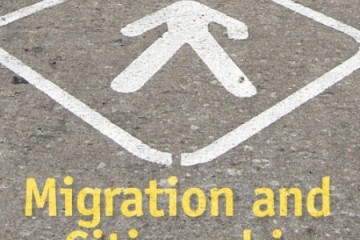
To be alive is to have hope
I traveled to the Calais migrant and refugee camp from March 14 to 16, together with a humanitarian student group from Brasenose College that collected donations and supplies to aid local NGOs with clothing and basic medical supplies. This article is based on my impressions of the camp and interviews with the migrants, refugees and NGO workers.

Politics of restriction in the Euro-Mediterranean area: Lampedusa and beyond.
In line with the growing socio-economic and political significance of immigration, Europe has seen a wide range of policy measures aiming at either halting migrants from reaching Europe or deterring them from settling in their preferred countries of destination (Gibney 2004).
One of the implications of these policy efforts has been to turn the Mediterranean into a highly militarised zone. Yet the collapse of the political structures of several North African countries in the early 2011 was a huge blow for bilateral and multilateral cooperation mechanisms. In particular, immigrant arrivals to Europe through Lampedusa, an Italian island and one of the closest points from the African mainland, triggered a range of public and political discussions.
It is important to reflect upon the symbolic power that immigration possesses in European domestic politics. The social construction of immigration as a threat have shaped the national and EU-level responses to the arrivals of immigrant and asylum-seekers in the western Mediterranean. Most public and political worries were about irregular migration, a major challenge to the very idea of state borders.

Valorised and Vilified: What Do ‘Citizens’ Do? Initial Linguistic Reflections
It is clear that debates about ‘who’ citizens are (as well as normative claims about who they ‘should’ be) are important to understanding the politics of citizenship. However, reflecting on the remit of this special series on ‘Migration and Citizenship’, another fundamental question occurred to me: what do citizens do? Describing the kinds of actions and activities in which citizens—however we may define them—reportedly engage could open further discussion about the nature of citizenship itself.
In my current work with the Centre on Migration, Policy, and Society (COMPAS), I focus on the ways that British newspapers talk about migration issues and relate these narratives to public perceptions and migration policy changes. Using techniques from corpus and computational linguistics, which enables researchers to analyse large amounts of text, I look for (ir)regularities and significant patterns of words. These contextual patterns, called ‘collocations’, can provide insight into a concept: one of the major contributors to linguistics, John Firth, famously expressed this feature of language when he said ‘you shall know a word by the company it keeps’. Applying Firth’s guiding principle to study of UK press portrayal of migrant groups reveals that, in the case of immigrants and asylum seekers, their company is relatively negative. Dr Scott Blinder and I showed that from 2010-2012, the British national press most often described ‘immigrants’ as ‘illegal’ while portraying ‘asylum seekers’ as ‘failed’.
But what about citizens? What does this group of people reportedly do in the context of migration coverage?

Citizen enforcers? Implementing immigration controls through devolution and allegation
In recent years there has been an increasingly systematic integration of immigration controls into a range of institutions. The ability to access healthcare, social housing, benefits and legal aid, to seek employment, open a bank account, obtain a driving license, and rent a property have each been tied to immigration status. This linkage is mediated by more than a binary between legality and illegality. The regulation of mobility through legal frameworks at the European and international level, as well as the domestic, has generated a range of rights – to reside, of abode, to work, to rent – that are shaped by the interaction of multiple statuses – “EEA national”, “asylum seeker”, “habitual resident”, “jobseeker”, “worker”, “self-sufficient person”.
The rights and entitlements of citizens, as well as migrants, are curtailed and impacted by immigration controls. A citizen cannot claim means-tested benefits without proving habitual residence, they cannot marry a non-EEA national without verifying the partnership’s legitimacy in the eyes of the state, and they cannot bring this spouse into the UK without earning over a minimum income threshold. More broadly, citizens cannot avoid immigration controls without first proving that they are not subject to them.
It is important to understand and reflect upon the consequences of these controls. However, it is also important to think about where the responsibility for their implementation lies. As immigration controls are integrated in an increasingly systematic way into the workplace, university, school, hospital, jobcentre, letting agency, registry office and bank they are pushed away from the centralised state and into the community. This entails both a diversification and a shift in the actors compelled to put them into practice on the ground. Last week’s European Court of Justice decision on the Dano v Jobcentre Leipzig case brings this into focus. For the individual who cannot be subject to formal immigration controls but who can be excluded from social benefits if economically inactive, immigration enforcement responsibilities fall not to the immigration officer but to the frontline public service worker.

Citizenship and identity: The new Britons in an age of resurgent Englishness
In the 1990s, commentators across the political spectrum observed the rise of civic British national identity in the UK. Both the Major and Blair governments promoted “active citizenship” and rolled out polices such as Citizenship Ceremonies for the naturalised and citizenship education in schools – with the civic republican philosopher Bernard Crick a significant influence over many of these reforms. From a very different angle, the Britpop moment and “cool Britannia” brand made the Union Jack fashionable. A confident multiculturalism and relaxed, mongrel Britishness was part of the zeitgeist.
From the vantage point of 2014, that moment seems very distant. In the last decade, we have seen instead a resurgence of the infra-national identities of the UK’s constituent countries: the renaissance of Scottishness in Scotland, the rise of Welshness in Wales, and – much less reflected upon – the return of Englishness in England.
The return of the English
The 2011 Census included a national identity question. It showed that, in England, Englishness is the predominant national identity, expressed by two thirds of the population (with 58% choosing only English identity), while just 29% identify with Britishness (19% choosing only British identity).
For many, this kind of Englishness is probably expressed activities such as cheering on (or moaning at) English sporting teams. But we have also seen its political mobilisation: in resentment at Scottish power in Westminster, in the sinister street theatre of the English Defence League and its offshoots, and in the rise of UKIP.
It is important, however, to note the geographical and generational dynamics of this resurgent Englishness.

Tilling the fields where forced labour grows
Unless you are following the story closely, you may not have noticed the worryingly slow progress of the “Modern Slavery” bill through parliament. It faces its third reading in early November, and so far there is no outright opposition. Of course no one is going to speak up for modern slavery. It is a dreadful thing, and no parliamentarian would defend it for a moment.
Instead, the delays have come from wrangling over wording, caused by the politics over immigration. The problem is that Home Secretary Theresa May describes the crime as “human beings used as commodities for the personal gain of others” (Hansard, 8 July 2014 col. 166), provoking the question of how this form of exploitation differs from other “everyday” exploitation faced by many (if not most) workers.

Migration and the political
Ever since the collapse of second-world socialisms as “actually existing” political alternatives to global capitalism, the political terrain has shifted considerably. Old political subjects, such as class, seem to have disappeared or waned in significance, while new political subjects are elusive. Political action consists of seemingly unorganised and spontaneous mass events without clearly articulated agendas or of practices of daily life that have subversive political effects. Both forms of political action are often invested with hope that they will somehow enable alternatives to the currently predominant forms of organising collective life.[1]
This political desire also attaches to migration. Some years ago, Étienne Balibar wrote of immigrants as “today’s proletariat” (2004: 50). More recently, Dimitris Papadopoulos, Vassilis Tsianos and Niamh Stephenson (2008) have written about clandestine migration as imperceptible politics, namely as a social practice that does not have an explicit political goal, but that brings about large-scale shifts in the political field. The prevailing sentiment in activist circles seems to be that if migration is disruptive, as mainstream political elites suggest, then this disruption might as well be put to different political ends. Thus, for example, a group of scholars and activists working on borders recently occupied the discursive terrain by introducing new keywords in migration and borders, such as “militant investigation”, “counter-mapping” and “bordering” among others (Casas Cortes et al. 2014).

The floating label of ‘the migrant’
“Hang on they are not tourists”, a UK citizen said to his wife with wide eyes and an expression on his face suggesting this realisation was a big surprise. “They could even be ‘migrants’…couldn’t they?”
This is a question — in this case one I heard in an interview — that has always been complex, but is becoming even more so, in the UK and elsewhere. Time has changed legal and regulatory circumstances, and the demographic of people who come to Britain have also changed.
These changes have generated new migrant categories, typologies and tiers but also new stigmas, phobias and labels.
Who is a migrant? Alas, there is no clear legal or administrative definition of ‘migrant’. A 1953 United Nations recommendation referred to the definition of “permanent immigrants” as non-residents (both nationals and aliens) arriving with the intention to remain for a period exceeding a year and of “permanent emigrants” as residents (nationals and aliens) intending to remain abroad for a period exceeding one year (United Nations, 1953).









